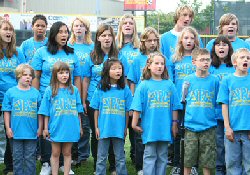Camp Chorister
by Gary D. Penkala
 Would you like to:
Would you like to:
- Recruit some new young singers?
- Give the kids a fun mid-summer break?
- Make some parents happy?
- Improve your youth choir's skills?
- Provide a nice choral Mass in the middle of summer Ordinary Time?
A choir camp can do all these, with minimal effort.
Here's an outline:
Choose a week in mid-July for the camp.
A morning session (9:00 am - 12:00 noon) for five days is a good time frame, with the kids singing at a weekend Mass after camp.
Set a minimum and maximum attendance number — we used 20 - 30 choristers.
Divide the singers in two groups by age [Group A: 7 -10 years] and [Group B: 11 - 14 years].
Choose your activities might last 30 minutes, for example:
- Sectional rehearsal / ear training
- Chant practice
- Silly songs
- Handchimes or Handbells
- Grand Rehearsal
- The Sectional rehearsal can work on individual voice lines (soprano or alto, for example), or tricky parts of an anthem.
You might invite some "youth conductors" to try their hand at leading this small group.
Some good ear training exercises should be incorporated in this time — identifying or singin intervals, working with solfege syllables (DO, RE, MI, etc.), introducing Kodaly hand signs, clapping rhythms.
- Chant practice should introduce basic neum notation, with names (kids love cool new nomenclature!).
Good singing technique, with relaxed, light tones, should be taught.
Work on correct, pure Latin pronunciation.
Some good repertoire would be an easy chant hymn like Adoro te devote or the Proper Communion antiphon for the Sunday they sing.
Choosing the Communion Proper might allow the younger singers to concentrate on the antiphon alone, while the older choristers sing the verses.
- Silly songs are just that — music just for fun.
These songs will never be sung in church, they're just for immediate enjoyment.
Choose campfire songs, or Broadway hits, or children's favorites.
We'll use a quodlibet called the "Orchestra Song," some favorites from the Sound of Music, and maybe even a Gilbert & Sullivan patter song for the older kids.
- The Handchimes are a really draw for the camp — kids love them, and this may wind up being the favorite activity.
Handchimes are a light-weight, "kid-friendly" version of handbells, but lacking these, handbells will do.
If your parish has neither, check with local Protestant or Catholic churches — maybe you can borrow a few octaves during the summer when they're not being use anyway.
Inquire with Schulmerich and Malmark about their company policy on loaning sets of handbells.
They may be quite willing to put a set in your hands, with the possibility of a future sale — be careful, they're quite addictive!
- The Grand Rehearsal is just that — time to put everything together at the end of the morning.
Bring both groups together in the rehearsal room or in the church.
Practice the anthems, Mass parts, descants and chant that they'll sing for Sunday.
Choose repertoire that's feasible in a week's worth of daily practices.
It should also challenge the singers a little, since there's no sense rehearsing an easy piece five times in a row.
Plan to include a break time mid-morning, with a snack.
Include some fun music-related games during the break:
- Singo: a Bingo game using musical symbols instead of numbers.
- Concertration: A large board filled with 30 envelopes, filled with 14 pairs of music symbols cards and 2 WILD cards; the goal is to collect points by identifying the card the player calls, more points for finding its match. Wild cards match anything.
- Musicodu: the popular Sudoku game, with music symbols replacing the numbers; use easy 6 square grids for younger kids.
- Solfege Blocks or Melody Caterpillars:
Cover small cardboard boxes (pencil boxes) with paper and a solfege syllable (DO, RE, MI, etc) and have singers build scales or patterns to sing (or play on Orff instruments).
Solfege circles, made with construction paper, can be fastened to a white board or chalk board with small magnet stickers on the back; make Melody Caterpillars by stringing the circle together.
- Musical Flash Cards: These can be used in Concertration, or for quick identification at sight.
Other games are possible with Flash Cards, like Musical Baseball (where "batters" advance bases for correct answers), or Musical Squares, patterned after Hollywood Squares (where players try to get three Xs or Os in a row).
Recruit campers from existing choirs, from CCD classes, and using the bulletin, announcements, and — best of all — personal invitation!
Camp counselors can come from adult choirs, from teenage choirs, or from kids choir parents.
A format like this can be handled with just 2 music leaders (choir director & organist, for example).
Young counselors would help with routine chores: snacks, playing games, rehearsal assistance.
Daily Schedule:
9:00 - 9:15 am- Opening Activity and Prayer
9:15 - 9:45 am- Group A: Chant / Group B: Handbells
9:45 - 10:15 am- Group A: Handbells / Group B: Chant
10:15 - 10:30 am- Snack break and musical games
10:30 - 11:00 am- Group A: Sectional & Ear Training / Group B: Silly Songs
11:00 - 11:30 am- Group A: Silly Songs / Group B: Sectional & Ear Training
11:30 am - 12:00- Grand Rehearsal
This regular daily schedule might be altered occasionally; for example, you might have a sung Morning Prayer one day, or an organ demonstration in the loft.
The format is very flexible.
Whatever you do, make the camp fun and educational, so the campers enjoy themselves and learn in the process.
|


 Would you like to:
Would you like to: